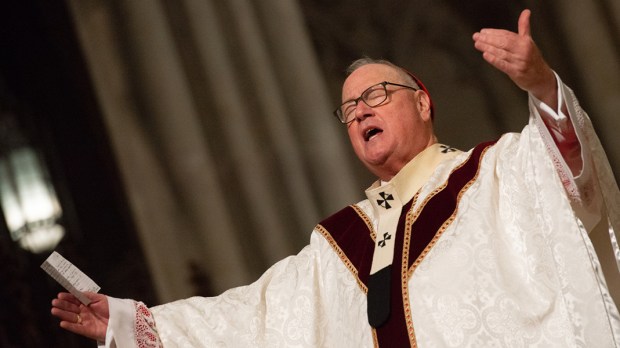“Write on a scroll what you see.”Then I turned to see whose voice it was that spoke to me,and when I turned, I saw seven gold lampstandsand in the midst of the lampstands one like a son of man,wearing an ankle-length robe, with a gold sash around his chest.When I caught sight of him, I fell down at his feet as though dead.He touched me with his right hand and said, “Do not be afraid.I am the first and the last, the one who lives.Once I was dead, but now I am alive forever and ever.I hold the keys to death and the netherworld.”—Revelation 1:12-13, 17-18
The Second Sunday of Easter is a day of visions. In the Second Reading, taken from the Book of Revelation (and quoted above), the seer of Revelation has a dramatic encounter with the One who is “alive for ever and ever.” Then, in our Gospel, we hear of Thomas’ meeting with the Risen Lord one week after that first Easter morning. And, as it is “Divine Mercy Sunday,” we remember the graces given Saint Faustina Kowalska, “the great apostle of mercy,” in her visions of Jesus in the early part of the 20th century.
While it is easy to get distracted by the power and vivid imagery of these ecstatic encounters (and here we might think of Caravaggio’s immortal painting “The Incredulity of St. Thomas” or the beloved rendering of Saint Faustina’s vision of the merciful Christ), these visions are really an encounter with Divine Mystery. The three ecstasies that give shape to our liturgy this Sunday remind us of the original meaning of the word “ecstasy” and the promise of Easter joy. As Henri Nouwen has written,
“Ecstasy” comes from the Greek ekstasis, which in turn is derived from ek, meaning “out,” and stasis, a “state of standstill.” To be ecstatic literally means to be outside of a static place. Thus, those who live ecstatic lives are always moving away from rigidly fixed situations and explore new, unmapped dimensions of reality. (from In the House of the Lord)
This newness is the cause of our joy because the newness of Easter—the new depths of Divine Mystery experienced by the seer of Revelation, the Apostle Thomas, and St. Faustina—pushes aside what is old, because, as Nouwen continues, “There can be old pain, old grief, and old sorrow, [but] there can be no old joy.” Joy is ecstatic because it moves us out of what is old and stagnant into the newness of Resurrection life. This is why Pope Francis, at the beginning of his encyclical Evangelii Gaudium, could write:
The Joy of the Gospel fills the hearts and lives of all who encounter Jesus. Those who accept his offer of salvation are set free from sin, sorrow, inner emptiness and loneliness. With Christ joy is constantly born anew (no. 1).
This call to joy is also an invitation to take on a contemplative stance in the face of the Easter Mystery. This is, in fact, why we have the great Fifty Days of the Easter Season to bask in this new light and to allow the newness of Easter joy to permeate our minds, hearts, and souls. The joyful newness that we experience in these days overflows a single “Easter day,” transforming these Fifty Days into one great season of “Alleluia!”
While few of us will be afforded the graced moments of encounters enshrined in this Sunday’s liturgy, we should always be mindful of the moments of encounter that are available to us, as we meet the Risen Savior in the Word, the Eucharist, in the life and prayer of the Church, and, in a special way, in the poor and marginalized (see Misericordiae Vultus, no. 15). Because, while we have not seen in the way that those privileged souls were graced to see, we are blessed in our belief in the promise and presence of the One who has conquered sin and death.
What newness of life and joy have you experienced during this Octave of Easter? How have you experienced the grace of mercy in your life? How are you being invited to offer mercy to others? How can you continue to enter more deeply into the Easter Mystery as we continue the Easter Season?
Words of Wisdom: “The early disciples had little ritual but a mighty realization. They went out not remembering Christ, but experiencing him. He was not a mere fair and beautiful story to remember with gratitude—he was a living, redemptive, actual presence then and there. They went out with the joyous and grateful cry, ‘Christ lives in me!’ The Jesus of history had become the Christ of experience.”—E. Stanley Jones

Read more:
Not feeling much Easter joy? Here are some Bible passages to help

